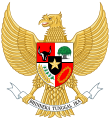
The Indonesian National Awakening is a term for the period in the first half of the 20th century, during which people from many parts of the archipelago of Indonesia first began to develop a national consciousness as "Indonesians".
The history of Dutch nationality is the emergence of a sense of national identity in the territory of the Netherlands. Consciousness of national identity was manifested through shared national obligations and rights such as taxation, military service, political and social rights, but most importantly through the concept of citizenship. Dutch nationality was forged through conflict which helped the people of the Low Countries develop a unifying idea of the Netherlander.

The Dutch East Indies, also known as the Netherlands East Indies and Dutch Indonesia, was a Dutch colony with territory mostly comprising the modern state of Indonesia, which declared independence on 17 August 1945. Following the Indonesian War of Independence, Indonesia and the Netherlands made peace in 1949. In the Anglo-Dutch Treaty of 1824, the Dutch ceded the governorate of Dutch Malacca to Britain, leading to its eventual incorporation into Malacca (state) of modern Malaysia.

The Soetardjo Petition was a motion of the Volksraad of the Dutch East Indies, instigated by the member Soetardjo Kartohadikusumo, which was submitted as a petition to Queen Wilhelmina and the Estates General of the Netherlands asking for more autonomy.

The Indonesian Political Federation was an umbrella organization of various nationalist organizations in the Dutch East Indies which existed from 1939 to 1942. Founded to unite the nationalist movement, GAPI championed the creation of an Indonesian parliament in exchange for cooperation with the Dutch colonial government. The federation consisted of eight political parties. GAPI was dissolved shortly after the invasion of the colony by the Empire of Japan in 1942.

Frans Hendrik Karel Zaalberg was an Indo (Eurasian) journalist and politician in the Dutch East Indies.
Pieter Frederich Dahler, more commonly known as P.F. Dahler or Frits Dahler, was one of the leading Indo (Eurasian) politicians and activists advocating integration of the native Indo-European community into the indigenous society of the Dutch East Indies. After World War II he changed his name to Amir Dachlan.

The Volksraad was an advisory, and later semi-legislative institution for the Dutch East Indies, provided for by law in 1916 but only established with the actual installation of the Council in 1918. It was a hesitant and slow attempt at democratisation of the Dutch East Indies as part of the "ethical policy" adopted by the Dutch government. The power of the Volksraad was limited as it only had advisory powers. Although part of the council was elected, only a small proportion of the population had voting rights.
Insulinde (1913–1919), a direct successor of the Indische Party (IP) and later renamed the Nationale Indische Party (NIP), was a political organization that represented efforts by some Indo Eurasians to identify and cooperate with the Indigenous educated élite of the Dutch East Indies in an effort to establish an independent dominion. The organisation was mainly led by Indo-European and Javanese activists, but had a considerable membership in the South Moluccas. It was considered part of the more radical political wing in the colony, for which it faced much oppression from the colonial authorities.
Elections to the Volksraad were held in the Dutch East Indies in 1921. The result was a victory for the Political Economic Union.

Elections to the Volksraad were held in the Dutch East Indies in 1924.

Elections to the Volksraad were held in the Dutch East Indies in 1927.

Elections to the Volksraad were held in the Dutch East Indies in 1931.

The governor-general of the Dutch East Indies represented Dutch rule in the Dutch East Indies between 1610 and Dutch recognition of the independence of Indonesia in 1949.

The Indo people or Indos are Eurasian people living in or connected with Indonesia. In its narrowest sense, the term refers to people in the former Dutch East Indies who held European legal status but were of mixed Dutch and indigenous Indonesian descent as well as their descendants today.
Phoa Liong Gie Sia was an Indonesian-born Swiss jurist, politician and newspaper owner of the late colonial era in the Dutch East Indies.
Elections to the Volksraad were held in the Dutch East Indies in 1935.
Ko Kwat Tiong Sia (1896–1970), known as Mr. Ko Kwat Tiong and later Mohamad Saleh, was a prominent Indonesian politician, lawyer, civil servant and university lecturer. He was elected to the Volksraad in 1935 as a representative of the Partai Tionghoa Indonesia, and – after Independence in 1945 – headed the Balai Harta Peninggalan in Central Java until retiring in 1960.
Han Tiauw Tjong Sia (1894–1940), known as Dr. Ir. Han Tiauw Tjong, was a prominent colonial Indonesian politician, engineer, community leader and a member of the influential Han family of Lasem. He sat in the Volksraad of the Dutch East Indies for two terms, and was a founding member of the centre-right political party Chung Hwa Hui. Han also served as a Trustee of the Technische Hoogeschool te Bandoeng from 1924 until 1940.
Abdul Rasjid Siregar gelar Mangaradja Mahkota Soeangkoepon, commonly known as Dr. Abdul Rasjid, was a politician and physician in the Dutch East Indies. He was elected or appointed to the Volksraad from 1931 to 1942, during which time he sat with the Indonesian nationalist faction. During the 1930s, he became convinced that public health and cooperation with traditional healers should be central to the mission of physicians in the Indies.













